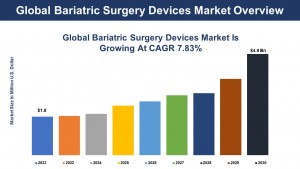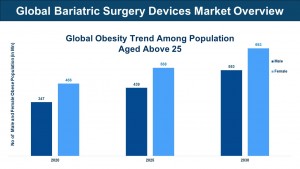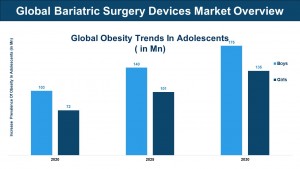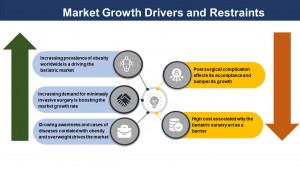Ahmedabad, Gujarat Jul 29, 2024 (Issuewire.com) - Insights10 is a healthcare-focused market research platform with an objective of supporting data-driven decisions and delivering actionable insights for healthcare and life science organizations. Insights10 platform provides syndicated and customized research reports in healthcare and allied industries such as pharmaceuticals, diseases/therapies, medical devices, digital health, healthcare services, OTC and nutraceuticals, etc. Insights10 currently provides 30,000+ different reports on different topics at a global as well as country-specific level, making it one of the largest collections of syndicated research reports in the Life sciences and Healthcare sector available across the world.
The global bariatric surgery devices market is emerging as a critical sector in the healthcare industry, primarily due to the escalating rates of obesity worldwide. As obesity continues to pose significant health risks, including diabetes, heart disease, and various other comorbidities, the demand for effective weight-loss solutions has surged. Bariatric surgery, which involves surgical procedures on the gastrointestinal tract to induce weight loss, has become a viable option for many individuals struggling with severe obesity.
Obesity is a major public health challenge that affects almost every country in the world. Globally, obesity rates have been increasing steadily over the last three decades. In almost every region, there are now more people living with obesity than underweight, and if current numbers continue to rise. According to the World Heart Federation, a poor diet is a leading risk factor for obesity, type 2 diabetes, and cardiovascular disease. Around the world, an estimated 2 billion people lack access to safe, nutritious, and sufficient food. This also highlights the fact that in the last 50 years, increased production of processed foods, rapid urbanization, and changing lifestyles have led to a shift in dietary patterns. The prevalence of obesity among children and adolescents has also seen alarming increases, with 37 million children under the age of 5 and 390 million aged 5–19 years being classified as overweight in 2022.
Type 2 diabetes is one of the most prevalent obesity-related conditions. According to the Centres for Disease Control and Prevention (CDC), nearly 90% of individuals diagnosed with type 2 diabetes are overweight or obese. Obesity contributes to insulin resistance, which is a key factor in the development of type 2 diabetes. The increasing prevalence of diabetes is alarming, with approximately 537 million adults living with the condition globally as of 2021, a number expected to rise to 783 million by 2045, according to the International Diabetes Federation (IDF).
Innovations in surgical techniques, including minimally invasive procedures, robotic-assisted surgeries, and the introduction of artificial intelligence (AI) in surgical devices, are transforming the bariatric surgery landscape. These advancements not only improve surgical outcomes but also enhance patient safety and recovery times, making bariatric surgery more appealing to both patients and healthcare providers.
Alongside the ever-growing pharma revolution in weight loss drugs, BariaTek Medical is one of the MedTech companies making sure device innovation keeps up with bariatric demand. The France-based company has successfully conducted the first implantation in the atrium of its BariTon device, a reversible implant that could offer an alternative to conventional weight loss surgery. The study is being conducted in both Australia and Uzbekistan. BariaTek’s BariTon is a reversible implant that consists of a gastric part and an intestinal part, reducing food intake and calorie absorption. The implant is delivered by endoscopy in an outpatient clinic.
Another recent development in the industry further underscores its dynamic nature. For instance, a study published in early 2024 highlighted the effectiveness of a new incisionless bariatric device developed by researchers at Royal Global University, which aims to replicate metabolic surgery outcomes without traditional surgical risks. Such innovations are expected to reshape the market landscape, offering patients safer alternatives.
Apple Vision Pro, an augmented reality (AR) device launched by the tech giant last year, was used for the first time in a live bariatric surgery. The procedure was performed by Dr. Mohit Bhandari, a leading bariatric surgeon, at one of the surgical centres of Pristyn Care in New Delhi. It included a sleeve gastric bypass and a Single Anastomosis Duodenal-Ileal (SADI) procedure. This technology facilitated enhanced precision in executing the, thereby minimising risks and improving patient outcomes.
While bariatric surgery can lead to significant weight loss and improvements in obesity-related comorbidities, it is not without risks. Postoperative complications can include internal hernias, gastroesophageal reflux disease (GERD), chronic nausea, and malnutrition, among others. These complications can lead to additional medical costs and may discourage patients from undergoing surgery. Furthermore, the presence of such risks necessitates a robust postoperative care framework, which can strain healthcare resources. Bariatric surgery is often associated with high costs, which can limit accessibility for many patients. The financial burden includes not only the surgery itself but also potential follow-up care and complications. Many insurance plans do not cover bariatric procedures, leading to out-of-pocket expenses that can be prohibitive for a significant portion of the population. This financial barrier can deter individuals from seeking necessary surgical interventions, thereby impacting overall market growth.
The major players operating globally and dominating the market are Medtronic, Ethicon, B Braun, Baxter, Apollo Endosurgery, Intuitive Surgery, Olympus Corporation, Abbott, Aspire Bariatrics, Conmed Corporation, and Cook Medical among others. Medtronic sets new standards with Live Stream technology and new AI analysis for laparoscopic and robotic-assisted procedures. Medtronic launches 14 new Performance Insights algorithms, boosting AI analytics in an expanded range of laparoscopic and robotic-assisted surgical procedures.
New technology from Johnson & Johnson aims to be a game-changer not only for patients but for surgeons, too. Ethicon, part of Johnson & Johnson MedTech, launches the ECHELON 3000 Stapler, a digitally enabled device that provides surgeons with simple, one-handed powered articulation to help address the unique needs of their patients. Designed with a 39% greater jaw aperture and a 27% greater articulation span,3,4 ECHELON 3000 gives surgeons better access and control over each transection, even in tight spaces and on challenging tissue.5,6 These features combined with software that provides real-time haptic and audible device feedback enable surgeons to make critical adjustments during procedures.
The future of the bariatric surgery devices market appears promising, driven by several trends that are poised to shape its evolution. Continued technological innovation, growing focus on preventive care, expansion into emerging markets and integration of digital health with all together boost the market in the near future. Robotic-assisted surgeries, allow for greater precision and control during surgery, leading to improved patient outcomes and reduced recovery times. The integration of robotic technology is becoming increasingly common in bariatric procedures, making surgeries less invasive and more efficient. Enhanced imaging techniques are facilitating better pre-operative planning and intraoperative guidance, which can help surgeons achieve optimal results. These technologies improve the visualization of anatomical structures, thereby minimizing complications. The incorporation of AI and machine learning in surgical devices is transforming the landscape of bariatric surgery. AI can assist in predicting surgical outcomes, personalizing treatment plans, and improving post-operative care, ultimately leading to better patient management.
Digital health technologies will revolutionize the landscape of bariatric surgery. Key developments include telemedicine, mobile health applications, and data analytics. The rise of telemedicine allows healthcare providers to conduct pre-operative assessments and post-operative follow-ups remotely. This can enhance patient engagement, improve access to care, and streamline the surgical process. Mobile health applications can assist patients in tracking their weight loss progress, managing dietary habits, and maintaining regular communication with healthcare providers. Such tools can improve adherence to post-operative care plans and enhance overall patient outcomes. Utilizing data analytics to monitor patient outcomes and identify trends can help healthcare providers optimize treatment protocols and improve the quality of care for bariatric surgery patients.
Media Contact
Mahima Reddy *****@healtharkinsights.com 09316397935 821, Sun Avenue One, Bhudarpura, Ambawadi, Ahmedabad, Gujarat https://www.insights10.com/













